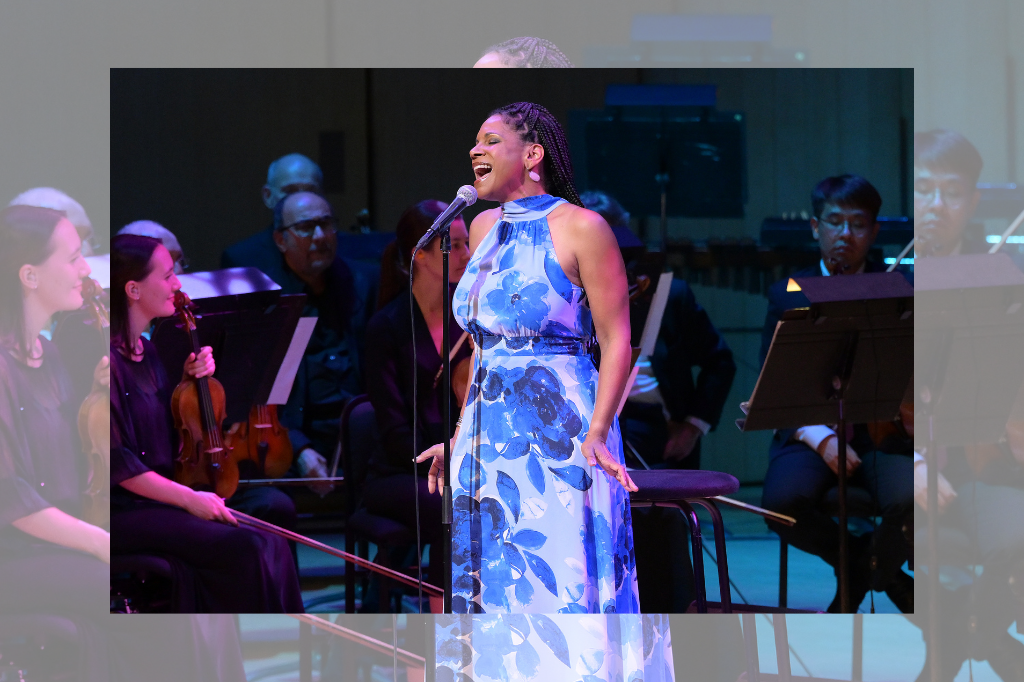REVIEW: There are no words for Audra McDonald at Roy Thomson Hall
Any critic tasked with reviewing Audra McDonald must confront language’s inadequacy. Adjectives like “brilliant” and “heart-stopping” confuse her with the swaths of lesser performers who’ve been described similarly, flattening the matter. Her greatness is so established, so obvious, that such declarations feel empty. And yet to avoid them is to risk understatement.
Her touring concert An Evening with Audra McDonald, which played at Roy Thomson Hall on November 2 with the Toronto Symphony Orchestra, blurs descriptive poles: the singer’s manner is laid-back though poised, the selections predictable yet profound, her voice controlled but free. McDonald has collaborated with conductor Andy Einhorn for over a decade, and their act glistens with polish.
Perhaps unsurprisingly for a six-time Tony winner (the most of any actor), the concert includes many showtunes. Act One trends toward standards — “Summertime,” “It Don’t Mean a Thing (If It Ain’t Got That Swing),” “I Could Have Danced All Night” — while Act Two gets a bit more contemporary, to the point that it features a song found on R&B singer Emily King’s TikTok.
Much of the show orbits notions of childhood. McDonald sings “Pure Imagination” because she used to love Willy Wonka and the Chocolate Factory, tells many a story about her four children, and invokes Kermit the Frog with a “Bein’ Green” cover. This exploration climaxes with a mash-up of “Carefully Taught” from Rodgers and Hammerstein’s South Pacific and “Children Will Listen” from Sondheim’s Into the Woods, two numbers highlighting how young people are shaped by their environments.
That song pairing has a hidden biographical resonance: Hammerstein was Sondheim’s writing mentor, his own careful teacher.
The program includes other subtle nods at the artistic lineage of American musical theatre. McDonald sings “Fable” from The Light in the Piazza — which, she points out, was written by Rodgers’ grandson, Adam Guettel. And a Bernstein medley (“Some Other Time” / “Somewhere”) follows a Sondheim one (“What Can You Lose?” / “Not A Day Goes By”), reminding us of the duo’s collaboration on West Side Story. This material is standard for a musical theatre concert, but it feels different in McDonald’s hands because she’s directly worked with many of these writers, making her part of the family. Especially in the case of Sondheim, her interpretations feel rooted in the man and his spirit (“We miss him terribly,” she says).
What gets me about McDonald is her phrasing. She’s performed most of this repertoire for several years, and her delivery is both sublime and mature. Whereas many musical theatre singers wander into vibrato haphazardly, spontaneously adding it halfway through a note, McDonald largely restricts such transitions to held-out vowels at the end of songs. Most other notes are either entirely straight, or entirely vibrato. This careful juxtaposition between (poppy) tension and (operatic) release gives McDonald’s storytelling its exhilarating texture.
An Evening with Audra McDonald includes a handful of songs from the singer’s most recent solo album, 2018’s Sing Happy. As the concert winds down, a thesis related to that title emerges: live in the moment. Love today. It’s not an original message; but with McDonald’s voice filling the air, it’s more achievable than ever.
An Evening with Audra McDonald played at Roy Thomson Hall on November 2. More information is available here.
Intermission reviews are independent and unrelated to Intermission’s partnered content. Learn more about Intermission’s partnership model here.















Comments